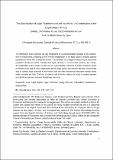Files in this item
The distribution of legal traditions around the world : A contribution to the legal-origins theory
Item metadata
| dc.contributor.author | Oto-Peralías, Daniel | |
| dc.contributor.author | Romero-Ávila, Diego | |
| dc.date.accessioned | 2015-09-07T08:40:03Z | |
| dc.date.available | 2015-09-07T08:40:03Z | |
| dc.date.issued | 2014-08 | |
| dc.identifier | 211244806 | |
| dc.identifier | 9f044162-a1dd-4676-a1bf-d5c01453c72e | |
| dc.identifier | 84922469000 | |
| dc.identifier.citation | Oto-Peralías , D & Romero-Ávila , D 2014 , ' The distribution of legal traditions around the world : A contribution to the legal-origins theory ' , Journal of Law and Economics , vol. 57 , no. 3 , pp. 561-628 . https://doi.org/10.1086/676556 | en |
| dc.identifier.issn | 0022-2186 | |
| dc.identifier.uri | https://hdl.handle.net/10023/7408 | |
| dc.description.abstract | The distribution of the common law was conditioned by a colonial strategy sensitive to the colonies’ level of endowments, exhibiting a more effective implantation of the legal system in initially sparsely populated territories with a temperate climate. This translates into a negative relationship of precolonial population density and settler mortality with legal outcomes for common-law countries. By contrast, the implantation of the French civil law was not systematically influenced by initial conditions, which is reflected in the lack of such a relationship for this legal family. The common law does not generally lead to legal outcomes superior to those provided by the French civil law when precolonial population density and/or settler mortality are high. The form of colonial rule in British colonies is found to mediate between precolonial endowments and postcolonial legal outcomes. | |
| dc.format.extent | 67 | |
| dc.format.extent | 389877 | |
| dc.language.iso | eng | |
| dc.relation.ispartof | Journal of Law and Economics | en |
| dc.subject | Law | en |
| dc.subject | Legal origins | en |
| dc.subject | Legal outcomes | en |
| dc.subject | Doing business | en |
| dc.subject | Colonialism | en |
| dc.subject | Endowments | en |
| dc.subject | Indirect rule | en |
| dc.subject | K Law (General) | en |
| dc.subject | BDC | en |
| dc.subject.lcc | K1 | en |
| dc.title | The distribution of legal traditions around the world : A contribution to the legal-origins theory | en |
| dc.type | Journal article | en |
| dc.contributor.institution | University of St Andrews. School of Management | en |
| dc.contributor.institution | University of St Andrews. Centre for Responsible Banking and Finance | en |
| dc.identifier.doi | 10.1086/676556 | |
| dc.description.status | Peer reviewed | en |
| dc.identifier.url | http://www.jstor.org/stable/10.1086/676556 | en |
This item appears in the following Collection(s)
Items in the St Andrews Research Repository are protected by copyright, with all rights reserved, unless otherwise indicated.

